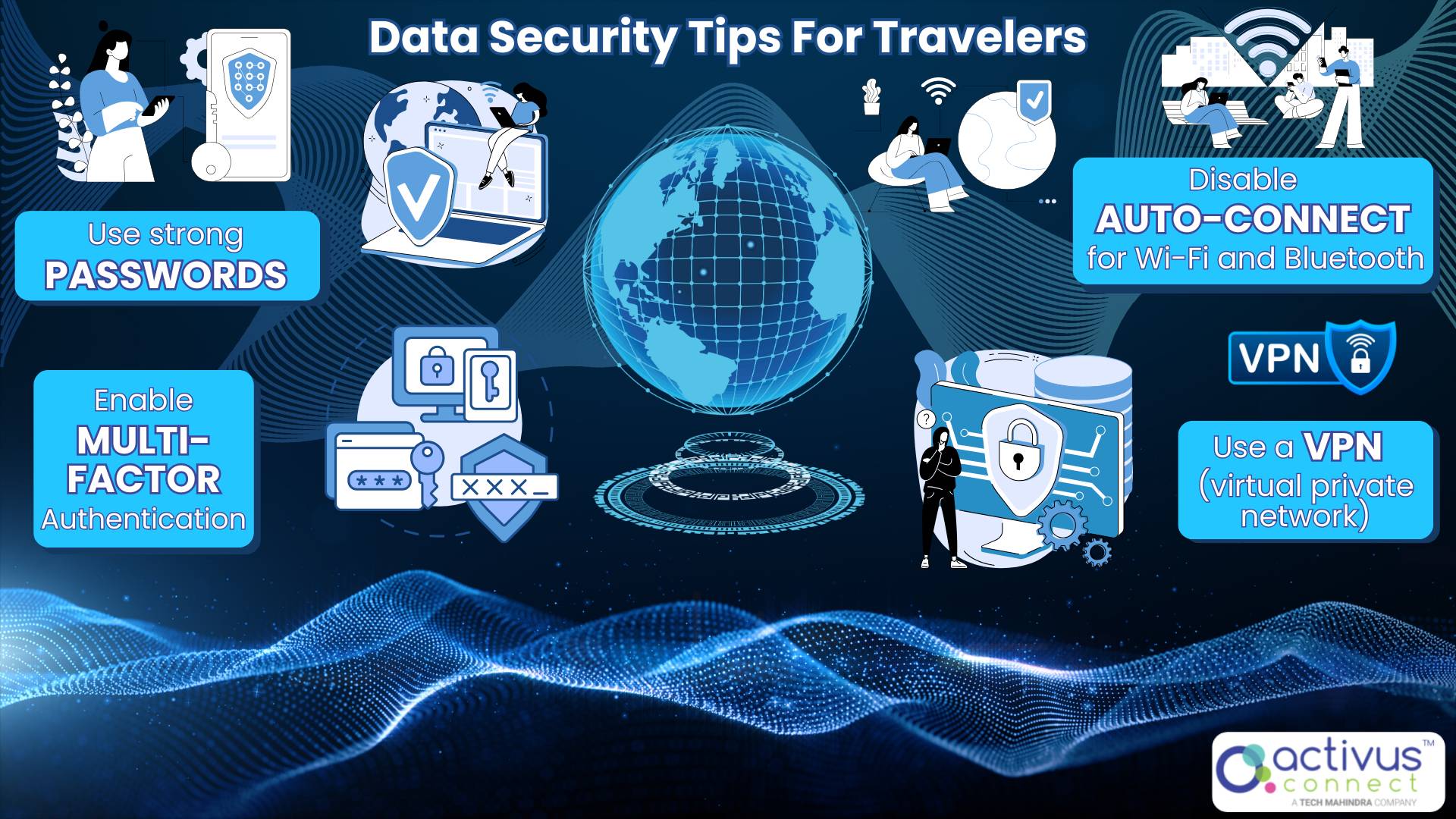
Ah, the joys of traveling abroad: stunning sights, unforgettable food, and… the sudden urge to clutch your phone like a lifeline. Let’s be real – no one wants to be the unfortunate soul scrambling to cancel cards after a coffee shop Wi-Fi session goes wrong.
As international travel becomes more accessible, so does the risk of digital threats. Hackers are increasingly targeting tourists’ personal data through public Wi-Fi, phishing scams, and unsecured networks.
But as it turns out, customer experience outsourcing (CXO) teams are like the secret agents of the travel world. Not only are they there to handle lost luggage and last-minute bookings, but they’re also trained to keep your digital life secure while you’re sipping margaritas abroad.
So, before you let your inner adventurer loose, let’s talk data privacy and how to utilize CXO for extra security. With a few easy tips and some help from customer service, you can keep your information as safe as your passport tucked into a money belt.
Let’s make sure your biggest travel woe is an overpriced latte, not a digital security disaster!
Preparing for Safe Travels: Data Security Basics
The truth is, travelers are incredibly vulnerable to identity theft and fraud, so before you take off on that dream trip, it’s time for a little “digital packing”. Just like you wouldn’t stuff your passport in your back pocket, you shouldn’t neglect your online security either.
Here are some quick and easy steps to take that can help you prepare:
- Back Up Your Data – Start with a solid backup of your data – because while your luggage may get lost in transit, your data doesn’t have to! Backing up your important files and contacts before traveling ensures that even if your device gets lost or stolen, you’ll still have access to essential information and your memories will be stored safely elsewhere.
- Enable Multi-Factor Authentication – Embrace multi-factor authentication (MFA) like it’s your new travel buddy; it’s that extra layer of security that makes hackers groan. Adding MFA makes it far more challenging for unauthorized users to access your accounts.
- Use Strong Passwords and Password Managers – If your password looks more like ‘password123’, let’s just say you’re inviting trouble. Create strong unique passwords with a combination of upper and lower-case letters, numbers and symbols. Using a password manager can help you keep track of all your passwords so you can avoid reuse.

Check out one of our previous blogs on Cyber Security Awareness for more information on simple yet effective security measures you can take to safeguard your devices, data and online identities from potential threats.
Secure Your Devices and Data in Transit
Picture this: you’re in a bustling airport, all set to grab that last-minute coffee, when your phone starts cozying up to every Wi-Fi network in sight like its networking at a party. Not ideal!
First rule of transit: turn off auto-connect for Wi-Fi and Bluetooth – your devices don’t need new friends.
Next, even if you don’t regularly have these on your phone, lock down your phone with a good PIN, facial recognition, or fingerprint scan while on your trip.
And if you must check your email or scroll through your bank account on public Wi-Fi, make sure you’re using a VPN. A VPN will encrypt your traffic so that no one within the public Wi-Fi’s network can sift through your browsing activities. It’s like a disguise for your data, so you can browse in peace while hackers get nothing but a dead end.
Protecting Personal Information in Digital Spaces
When it comes to sharing your trip online, think of it as a ‘post now, share later’ situation. While it’s tempting to flood social media with snaps from that iconic monument, broadcasting your every move can make you an easy target.
Avoid tagging real-time locations or revealing exact travel plans online; keep it vague until you’re back.
Also, limit how much personal information you share on public forms and travel apps – yes, even if that group chat swears its private. For extra security, use incognito mode and privacy-focused browsers when accessing sensitive information.
With a little caution, you can keep your trip secure without letting everyone in on the details.

Protecting Your Finances on the Go
There’s one small but crucial step that people often forget before traveling abroad: notifying the bank. (Western Union)
When it comes to money, treat your bank like an overprotective friend who insists on texting every hour to check in. Before you jet off, give them a heads-up on your travel plans so they don’t freak out when charges start popping up from a beachside taco stand halfway across the world.
Set up spending alerts too – so you’ll know if someone else tries to take your card for a shopping spree.
Resist the urge to hit up random ATMs; they’re like candy machines for scammers. Stick to bank affiliated ATMs and you’ll dodge the surprise fees and the lurking skimmers.
Let’s keep your biggest financial worry abroad limited to the price of your vacation cocktail.
Leverage Customer Service for Extra Security
Remember, customer service isn’t just for when your luggage vanishes into the travel void or your hotel key dies for the fifth time. They’re actually your round-the-clock secret security squad. They can help with those “Oops, I lost my card!” moments at 2 a.m.
With customer experience outsourcing (CXO), companies have an army of well-trained pros worldwide. They know all the ins and outs of data security, thanks to high-tech tools and solid security protocols. They’ve been trained to handle every scam scenario possible.
Before you leave, check in with your phone provider for travel-friendly data plans and roaming security tips – they might even have a magical setting that keeps you from accidentally racking up charges while scrolling videos abroad.
Your credit card provider is another superhero here, offering fraud prevention services that can freeze a card faster than you can say ‘unauthorized charge’.
Even hotels and airlines can pitch in; they’ll point you to secure Wi-Fi networks and assist if any suspicious activity comes up.
CXO teams are your low-key security team on the go. They are ready and waiting, with tailored advice and rapid responses so that when you’re frantically typing from a foreign Wi-Fi zone, they’ve got your back so you can relax and get back to the vacation life.
Conclusion
By leveraging customer experience outsourcing, you can ensure that you have access to expert support whenever you need it, giving you peace of mind while traveling. These trained professionals can provide immediate assistance to help navigate any unexpected financial hiccups or data concerns.
With just a few smart moves and the support of a solid customer service team, you’re all set to be the James Bond of data security – minus the tux.
From locking down devices to being a little mysterious on social media, you’ll keep your info safe so you can focus on what really matters: amazing sights, weird local snacks and a camera roll that’s 90% beautiful sunsets.
Remember, staying secure is about balance; be cautious but not paranoid, and lean on customer service like it’s your vacation wingman.
Here’s to a trip full of memories – and zero digital mishaps!